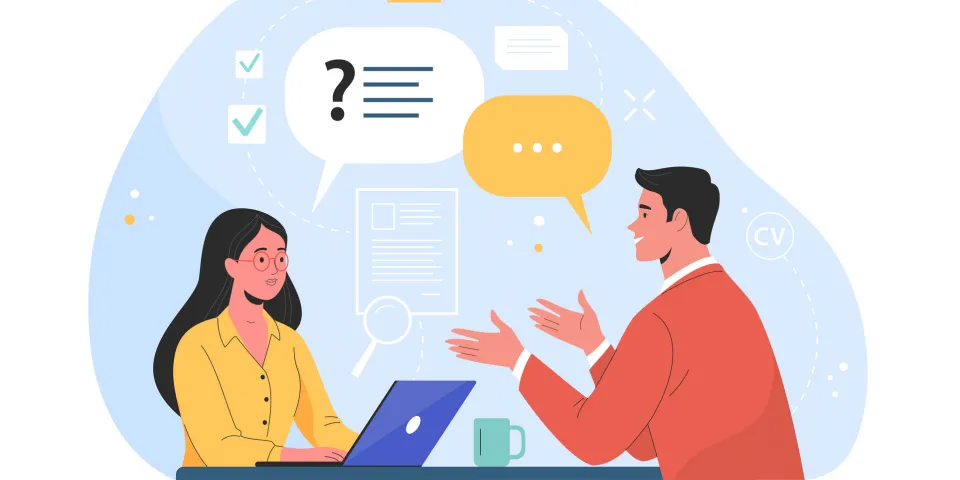Latest
Make the “Right” Mistakes in an Interview
Jun 21, 2021

After all your hard work developing a resume and finding a career that aligns with your skills, you finally secured an interview! Even though getting an interview is a big step, your work is not over yet. You must begin to strategize your interview technique to ensure you are in the best position to be offered the job.
Many interviewers will ask you, “What is your greatest weakness?” It is easy to get hung up on this question because you might worry that you will say something negative about yourself. The more you prepare for questions like this, however, the better you’ll be able to articulate your authentic self and address areas in which you plan to improve.
When interviewers ask questions about your weaknesses, they are most interested to see how you answer, how you identify weaknesses and most importantly, what steps you are taking to improve. Here are three strategies to help develop your framework to successfully turn your weaknesses into strengths and make the “right” mistakes in an interview.
1. Be honest
No one is perfect, even the most experienced professional. It is important to keep that in mind when strategizing how to address your weaknesses in an interview. Interviewers want to see your full spectrum – meaning the good, the bad and the ugly. We all have attributes and areas in which we need to improve, so this is your opportunity to address any of your weaknesses head-on confidently and authentically.
The more honestly and strategically you describe your areas of weakness, the more informed the interviewer will be. They can also begin to conclude how you may respond to challenges in the workplace. Honesty is the key to developing your strategy in sharing weaknesses. However, there is a fine line between being honest and being self-deprecating. Be candid about your weaknesses but don’t beat yourself up. You are not on trial during your interview, so don’t accuse yourself of your weaknesses!
If you have a hard time coming up with a workplace weakness, think about what others have said you need to improve about your professional skills and approach. The framework of honesty is key when discussing your weaknesses and ultimately can be perceived as a strength!
2. Share a weakness that is not vital to the job
When you share your weaknesses, it should be work-related, not from your personal life.
Choosing the “right” weakness to share can affect your perception in the interview. For example, if the job you are interviewing for requires that you excel at being detailed-orientated, you should not share that your weakness is overlooking details. This method of choosing an appropriate weakness will ensure you strike the balance of being honest with areas you seek to improve as well as not be screened from the selection pool too early.
It is beneficial choosing a weakness that is not tied to the core responsibilities of the job, and a weakness that can be overcome. Some common weaknesses to consider as you work to identify yours could include organization, delegation, timidity, focusing too much on the details and work-life balance Paying close attention to the attributes and skillset desired in the job you are applying to can provide the framework for selecting the “right” weaknesses to share!
3. Focus your response on growth
The more you can convey that you are aware of your weakness and can improve, the more you will stand out from others interviewing. So, while identifying and sharing your weakness is important, any growth that you can reflect on can lead to you standing out and inform the interviewer of your ability to overcome, adapt and continually improve.
For example, if your weakness is struggling with organization, a strong answer would first convey the impact of not being organized. You may state that your lack of organization may decrease your overall efficiency. You would then follow up with the steps or actions that you have taken, or plan to take and describe your growth. For example, you may say that you have increased your efficiency by implementing better organizational strategies. You may also choose to talk about another strength like maybe how you are using your teambuilding skills to help you stay organized.
When you talk to your interviewer, they do not expect that you’ll have mastered your weakness, so just be honest in your progress when describing any continued challenges. Be sure to highlight any growth, no matter how incremental it may seem. The more detail you can provide with your growth the more focus you bring to your ability to grow and improve, thus better informing your interviewer.
Even though you may be nervous, the interview portion of the application process is your place to shine! Following these strategies is your guide to effectively and authentically addressing your weaknesses while simultaneously showing your strengths. If you have any questions, know that the Career Development team is always happy to connect with you individually if you need help making the “right” mistakes in an interview!
Learn More About Our Career Programs
Bureau of Labor Statistics (BLS), U.S. Department of Labor, Occupational Employment and Wage Statistics 2023 / Occupational Outlook Handbook 2022. BLS estimates do not represent entry-level wages and/or salaries. Multiple factors, including prior experience, age, geography market in which you want to work and degree field, will affect career outcomes and earnings. Herzing neither represents that its graduates will earn the average salaries calculated by BLS for a particular job nor guarantees that graduation from its program will result in a job, promotion, salary increase or other career growth.
Latest
Recent Blog Posts
Subscribe to our Newsletter
Get the latest news you need to know, from study hacks to interview tips to career advancement. Have it delivered right to your inbox biweekly.








